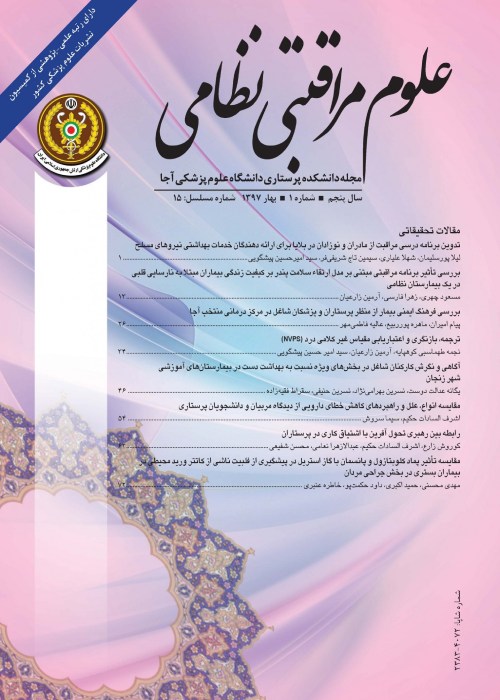The Effect of Mindfulness-Based Stress Reduction Intervention on Psychological Flexibility, Distress Tolerance, and Re-Experiencing the Trauma in Veterans with Post-Traumatic Stress Disorder
Author(s):
Article Type:
Research/Original Article (بدون رتبه معتبر)
Abstract:
Introduction
In Iran, a large number of veterans have post-traumatic stress disorder and many attempts were made to assess a variety of psychological treatments in this regard; the mindfulness-based stress reduction intervention is one of the methods that might be helpful.Objective
The current study aimed at investigating the effect of mindfulness-based stress reduction intervention on psychological flexibility, distress tolerance, and re-experiencing the trauma in veterans with post-traumatic stress disorder.Methods and Material: The current semi-experimental study was conducted in 2016 using pretest and posttest, and a control group. The study population included the veterans with post-traumatic stress disorder referred to Rajaei Hospital of Najafabad, Isfahan Province, Iran. A sample of 40 veterans were selected and randomly divided into the 2 groups of experimental and control. The data collection instruments were the acceptance and action questionnaire, distress tolerance scale, and secondary traumatic stress scale; both groups filled out the questionnaires in pretest. The experimental group was exposed to the mindfulness-based stress reduction therapy. Then, both group refilled out the same questionnaires in posttest.
Results
The data were analyzed with MANCOVA. The results revealed that the mindfulness-based stress reduction therapy had positive effects on distress tolerance (F=4.16, P0.05). The effectiveness in the subscale of distress tolerance (tolerance, absorption, evaluation, and set) and secondary traumatic stress (intrusion, avoidance, and arousal) was significant. The mean ± standard deviation (SD) of flexibility scores in pretest and posttest in the experimental group was 33.21±4.08 and 36.32±3.34, and in the control group was 33.48±5.83 and 33.17±5.57, respectively. Regarding distress tolerance in the experimental group the mean ± SD was 32.62±7.68 and 39.87±8.05, and in the control group was 34.77±9.66 and 9.66±10.00 in the pretest and posttest, respectively. About re-experiencing the trauma, the mean ± SD in the experimental group was 62.86±7.47 and 57.24±10.64, and in the control group was 57.24±10.64 and 54.76±12.52 in the pretest and posttest, respectively.Discussion and
Conclusion
The results showed a significant positive effect of the mindfulness-based stress reduction therapy on the increase of distress tolerance and decrease of post-traumatic stress disorder. Mindfulness training enables the individuals to merely observe and accept their emotional experiences and there is no need for making any changes. The result obtained from the analysis of psychological flexibility was probably due to small sample size of the current study. Keywords:
Language:
Persian
Published:
Journal of Military Caring Sciences, Volume:4 Issue: 4, 2018
Pages:
236 to 248
magiran.com/p1825347
دانلود و مطالعه متن این مقاله با یکی از روشهای زیر امکان پذیر است:
اشتراک شخصی
با عضویت و پرداخت آنلاین حق اشتراک یکساله به مبلغ 1,390,000ريال میتوانید 70 عنوان مطلب دانلود کنید!
اشتراک سازمانی
به کتابخانه دانشگاه یا محل کار خود پیشنهاد کنید تا اشتراک سازمانی این پایگاه را برای دسترسی نامحدود همه کاربران به متن مطالب تهیه نمایند!
توجه!
- حق عضویت دریافتی صرف حمایت از نشریات عضو و نگهداری، تکمیل و توسعه مگیران میشود.
- پرداخت حق اشتراک و دانلود مقالات اجازه بازنشر آن در سایر رسانههای چاپی و دیجیتال را به کاربر نمیدهد.
In order to view content subscription is required
Personal subscription
Subscribe magiran.com for 70 € euros via PayPal and download 70 articles during a year.
Organization subscription
Please contact us to subscribe your university or library for unlimited access!



